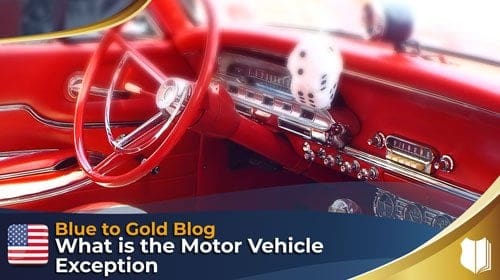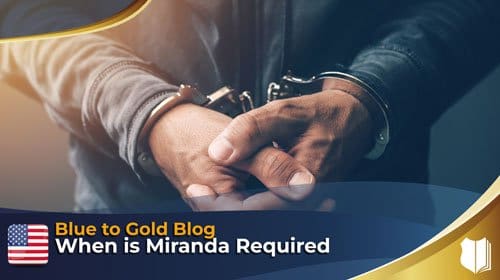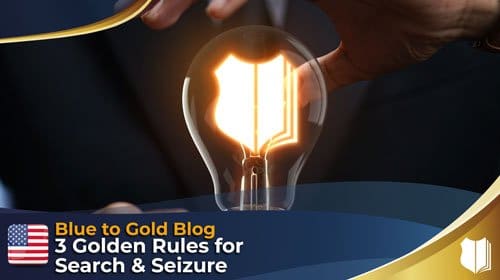

What is the Motor Vehicle Exception?
The automobile, or motor vehicle exception allows officers to search cars for evidence, contraband, and fruits or instrumentalities of crimes without a search warrant. When
or use our live chat
Customer Service


When is Miranda required during a detention?
There is some confusion on this subject. Many officers tell me that Miranda is required when the person is not free to leave. They were taught this. But unfortunately, it’s not true. That is not the legal standard.
Not being free to leave is a detention. But we know that during detentions, Miranda is not required. For example, during a DUI investigation, how many times have you read Miranda to a DUI suspect during tests? Almost never, because it’s a detention and you’re in the investigative phase. Yet the person is not free to leave. Certainly, if the person turned around and started walking away, you would detain them and probably arrest them for obstruction and for the DUI as well. But my point is; they are not free to leave, but Miranda is not required.
There are actually three components regarding when Miranda is required.
Number One: Arrest-like custody, or actual arrest.
Number Two: Imminent interrogation.
Number Three: Known officer.
Point Number One:
There are times when Miranda may be required, even though you have not intentionally made a formal arrest. Let’s say you put handcuffs on somebody and place them in the back of a police car, or point a gun at somebody and tell them to get on felony prone. More times than not, that is going to be an arrest-like custody. A reasonable person in those circumstances would believe that they were formally arrested. So that’s when Miranda is required. It’s possible that the courts are going to look at that as just a detention and not an arrest-like custody, but you’d better have the facts that back that up.
For example, if this suspect is believed to have committed an armed robbery, will the pointing of the gun and felony prone match the circumstances? If so, you should be fine. But if you point a gun, and you felony prone somebody for stealing a candy bar, that is certainly going to be arrest-like custody, and we may have an excessive force claim as well. But that is what you need to articulate, especially if you’re asked in court.
If an officer tells the court that Miranda is required when the person is not free to leave, that can cause a little embarrassment because that is not the standard. If the officer did not have probable cause at that particular point, then the officer is basically articulating that he or she committed an unlawful arrest. The point is this; articulate that it’s an arrest-like custody. Would a reasonable person in those shoes believe that they have been arrested? If the answer is yes, Miranda is required, even though you may not have intentionally wanted to arrest him yet; that’s just the way it works.
Point Number Two:
You must read Miranda before an imminent interrogation. For example, you arrest somebody, and put them in the back of a police car and you’re going to question them at the station. Miranda is not required at this point, because you’re not interrogating them; you’re not asking them questions that are reasonably likely to elicit an incriminating response. You can wait for the Miranda until you get to the station (or you can read it on-scene).
Miranda is required when you interrogate the in-custody suspect. In other words, when you’re seeking “testimony” from the suspect. Testimony means statements which tend to prove or disprove the crime in question. (Booking-type questions are not normally considered interrogation because they seek information not particularly related to the crime.) If interrogation is not imminent, Miranda is not required.
Point Number Three:
Finally, the third requirement is “known officer”. This means that the suspect knows that he is talking to an agent of the government. Because if you have a suspect who is in jail, somebody in a holding cell pre-arraignment, a 48 hour hold, or whatever your state does, and you insert an undercover agent into that jail cell and that suspect voluntarily confesses, that is valid and can be used against them. The undercover agent is not a known officer, and the confession is voluntary.
Those are the basic points regarding Miranda. I hope you find them useful!


The automobile, or motor vehicle exception allows officers to search cars for evidence, contraband, and fruits or instrumentalities of crimes without a search warrant. When


These three golden rules come from reading thousands of court cases over the last 20 years and seeing a theme regarding what the courts are


This question is: Can you look inside a woman’s purse, or a man’s backpack during a pat down? The answer is, “Maybe.” Here’s how this


Here is the question: Can an officer reach slightly into a person’s home to pull them out and arrest them? If an officer has probable
© Blue to Gold, LLC. All rights reserved